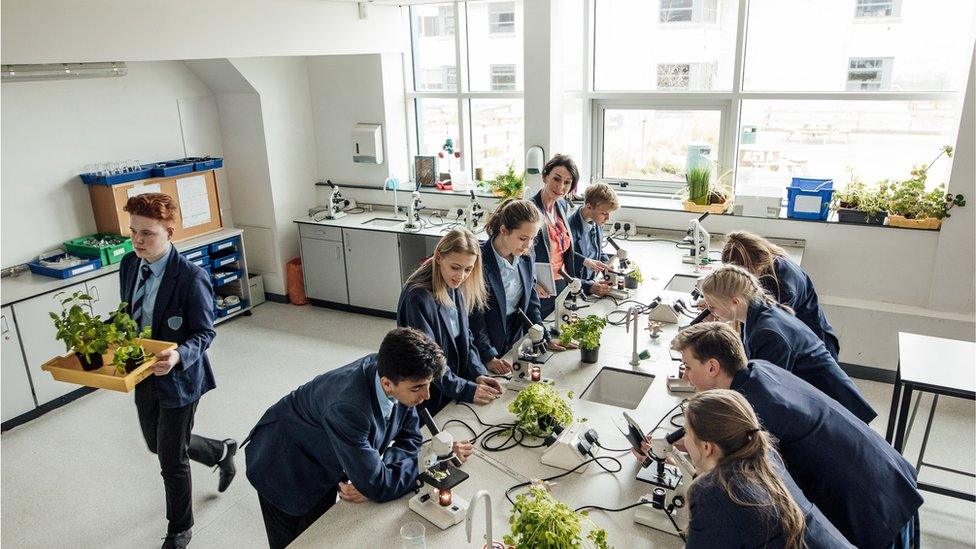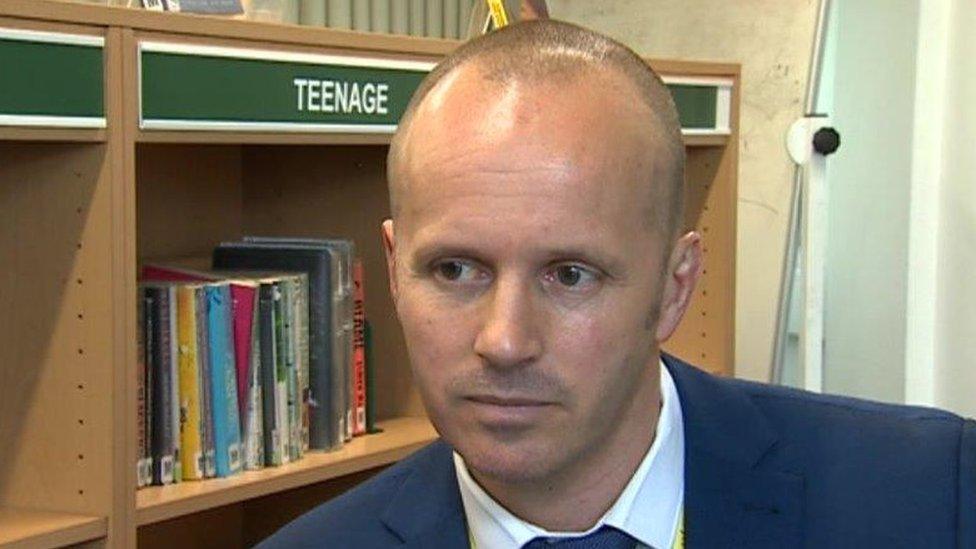Education: Draft school curriculum for Wales published
- Published
- comments

Growing minds: science and technology is one of the "areas of learning and experience", combining subjects
The draft of the new curriculum has been unveiled, in what has been called a "major milestone" in the biggest reform to Welsh schools in decades.
The education minister said the new curriculum would be a "big culture change" and "very different to what most of us will have experienced".
It will be introduced in 2022 for all children currently in Year 3 or below.
But unions have raised concerns that the aspirations could be jeopardised due to underfunding and job cuts.
The new curriculum aims to rethink what and how young people should be taught, and introduces six broad areas of learning and experience (AOLE).
It will be introduced in primary and Year 7 classrooms from September 2022 before being rolled out to all year groups.
Universities, employers, teachers and parents are now being asked to give their views before the final version is published next year.
Six areas of learning and experience
1Maths and numeracy
2Languages, literacy and communication
3 Health and well-being
4Humanities
5Science and technology
6Expressive arts
Teaching unions have been supportive of the vision at the heart of the curriculum but have raised some concerns about resources.
"A failure to invest in the workforce is making ministers' laudable ambitions for the education service in Wales ring increasingly hollow," the NASUWT's general secretary Chris Keates said.
"The growing number of teacher redundancies in Wales threatens to destabilise the implementation of the new curriculum."

Deputy head Damian Benney thinks some topics, such as Shakespeare, should be compulsory
Ministers emphasise that schools themselves have been instrumental in developing the new curriculum.
About 200 "pioneer" schools have been involved. There has been concern others will be much further behind.
Many teachers are hugely enthusiastic about the freedom the new curriculum could offer, but others will worry there is a lack of clarity around what is expected from them.
Damian Benney, deputy head teacher of Penyrheol Comprehensive in Swansea, said he was excited about having more freedom, but that the draft remained too vague.
"If there is variation in the quality and quantity of what is delivered in schools, there is the potential we could actually widen the attainment gap [between poorer pupils and their classmates] and not close it," he said.
He also said some subjects such as Shakespeare or the Holocaust should remain compulsory in all schools.
We're moving away from an outdated, narrow curriculum that sets out subject by subject, topic by topic and hour by hour what pupils should be learning.
Education Minister Kirsty Williams said the new curriculum would not amount to "a rule book".
"We're moving away from an outdated, narrow curriculum that sets out subject by subject, topic by topic and hour by hour what pupils should be learning.
"Using their considerable knowledge, experience and expertise, teachers in Wales have instead built a framework that sets out the fundamentals of a truly 21st-Century education."
She urged a wide range of responses to the consultation which runs until 19 July and said she would be embarking on a tour around Wales to discuss the proposals.
Expectations
Speaking on BBC Radio Wales' Good Morning Wales programme, she also reiterated the importance of not being prescriptive.
"We've published a framework setting out very clearly the purposes of the curriculum, the six areas of learning and experience, what matters in those areas, and what our expectations will be of what children will be able to do, and to have achieved by studying those areas...
"If we end up with a long checklist then this change will not meet its objectives," she said.
Responding to concerns the new curriculum could lead to variation in quality between schools, she said a national approach to assessment would provide accountability and consistency.
The Welsh Government has announced an extra inset day and said a total of £44m had been specifically set aside to support schools and teachers to prepare for the new curriculum.
This included £20m for development and implementation, and a further £24m - the single biggest investment in support for teachers in Wales since devolution - for professional learning.
Plaid Cymru's education spokeswoman Sian Gwenllian said the new curriculum has "the potential of revolutionising the learning experience of Welsh children and young people".
"But if schools are not able to prioritise the development of completely new ways of working locally and if there is inadequate training and professional development opportunities for teachers, and crucially if school finances do not improve, the whole initiative could prove disastrous for future generations," she added.
You can read more detail on the draft curriculum, including the six areas of learning, here., external
- Published30 April 2019

- Published10 January 2019

- Published9 April 2019
